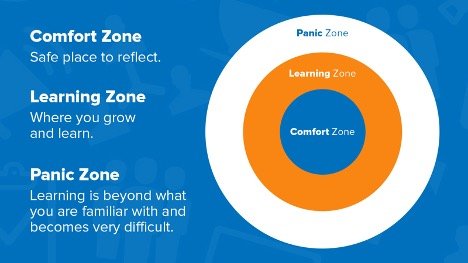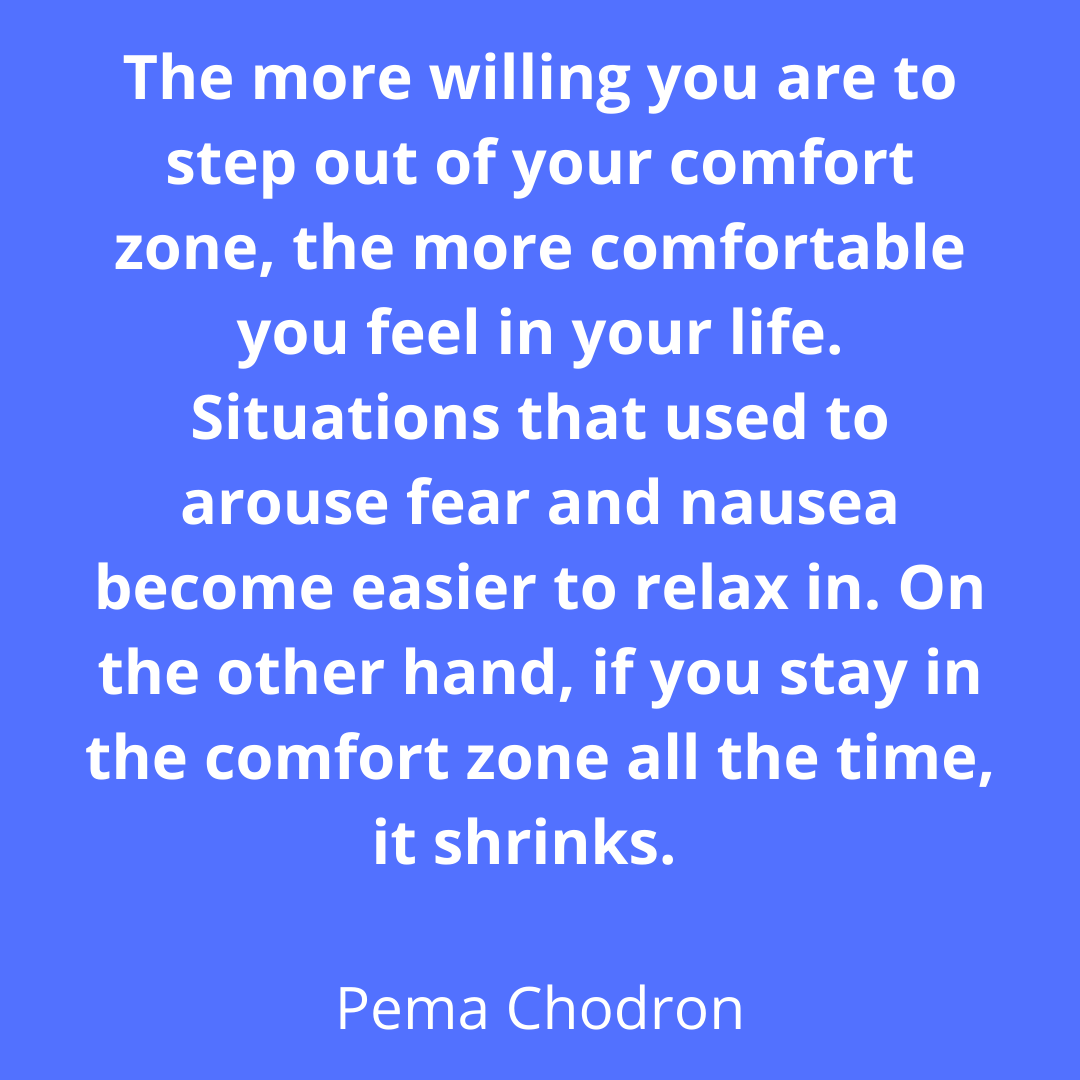I’ve been thinking a lot lately about comfort zones.
The pandemic forced most of us to stay in our comfort zones a good part of the time. We weren’t visiting new places, meeting new people, or taking on new challenges to the same degree as before. But as I talk with clients and friends and loved ones, I keep hearing things like, “I don’t think I want to leave my Covid bubble. I’m going to stay in my comfort zone.” As we feel our way into living with a new endemic disease, some people are finding themselves reluctant to break out of their comfort zones at all. I get that, but I worry that this path could be dangerous for our long-term well-being.
Let’s look more closely at the concept of a “comfort zone.” Psychologists note that in our comfort zones, things are familiar. We are not asked to do anything new, learn anything new, or risk anything new. Researcher Brene’ Brown say the comfort zone is “Where our uncertainty, scarcity and vulnerability are minimized—where we believe we'll have access to enough love, food, talent, time, admiration. Where we feel we have some control."[i]
Everybody’s comfort zones are different. Something that’s a piece of cake for you might be excessively challenging for me. Since I love to travel, it may surprise you to learn that I spent my childhood in terror of being away from home overnight. My younger sister eagerly spent the night with friends, and I had friends who spent the night with me, but I refused to do sleepovers, not even at my grandmothers’ houses. I went on trips with my family, but I was terrified of being separated from them at night. I had many fears, but the main fear was that something awful would happen to my parents and my sister in my absence. On the few occasions when I was away from home at bedtime, I was seized with terrible anxiety and cried until someone called my parents to pick me up and take me home. In fourth grade, I headed off to 4-H camp two hours from home, and I sought out my 4-H agent as soon as I got off the bus, begging to go home. My dad made the drive to collect me.
In sixth grade, I had the same response upon arriving with my class for a week at environmental camp. That time, however, my beloved history and government teacher, Mr. Henry told me gently but firmly that I was not going home. “You’ll be ok,” he told me. “You’ll have a good time.” It took a couple of mostly sleepless nights, and I suffered some anxiety all week, but Mr. Henry and the other chaperoning teacher (who also happened to be Mrs. Henry) checked in with me often and assured me that they’d take care of me. I settled in and had a pretty good time. And I learned a lot: about water and wildlife, about the history of my corner of Southern Appalachia, about how to share a bathroom and a dorm with fifteen other girls.
Gradually I grew more comfortable with opportunities to sleep over at friends’ houses and attend 4-H overnight events. As I challenged myself to step outside my comfort zone, I grew less anxious in general. I discovered the wisdom that Buddhist teacher Pema Chodron wrote about when she said, “The more willing you are to step out of your comfort zone, the more comfortable you feel in your life. Situations that used to cause fear and nausea become easier to relax in.”[ii] As I learned when I went to the environmental camp and spent the night away from home, learning happens outside my comfort zone.
As we move out of the acute phase of the pandemic, it’s tempting to stay in our comfort zones, but that’s a mistake, tempting as that is in turbulent times. Pema Chodron offered this warning; “If you stay in the comfort zone all the time, it shrinks.” In other words, if we never leave our comfort zones, those zones gradually become smaller and smaller. We become fearful of more and more situations and people. We stop learning and growing.
In her work on comfort zones, Chodron explores a model of the process of spiritual and psychological growth developed by a Soviet psychologist named Lev Vygotsky. Vygotsky visualized comfort and risk as being part of three concentric circles. The comfort zone is the very center where things are familiar and feel safe. The comfort zone can be a safe place to retreat to sometimes when we need to reflect or recover. But it’s also important to leave our comfort zone for a larger circle that Vygotsky called the learning zone. Here we discover new things about ourselves and about our world. Here we grow.
Vygotsky also recognized that it was possible to step too far outside our comfort zones. We could push ourselves too hard, into the panic zone, a place that is so challenging for us that it cannot nurture growth. It’s a place that feels too risky at the current moment.
For example, once I began to travel as a young adult, I thought I was ready to take on great levels of adventure. In my early thirties, I had the opportunity to join a faculty trip to Syria. I had never been out of North America, but in 1998, I signed on for the two week trip. And boy, was I in my panic zone. I didn’t know a soul in my group. After 20 hours of travel, we arrived at 10 pm Syria time. I was in immediate culture shock, engulfed by waves of anxiety in a world much different than my own and one where any communication with my loved ones at home was quite difficult. (Remember that the internet was in its infancy here, and it was practically non-existent in Syria.) I barely slept for the first four or five days, worrying myself sick that something awful would happen to a loved one at home while I was away or that I would be electrocuted in my hotel bathroom. (Electrical service was not quite up to US codes.) Eventually I calmed down, and today I remember the trip as one of the most important experiences of my life, but it definitely thrust me into my panic zone.
The challenge for us all as we emerge from our pandemic-produced semi-isolation is to challenge ourselves to step from our comfort zones into our learning zones. That learning zone will be different for each of us, but doing that work is important for our vitality and our mental health. Brene’ Brown said, "I've never done anything meaningful in my life that's been comfortable.”[iii] That’s true for me as well.
What about you? What meaningful experiences have come from stepping outside your comfort zone? What do you need to do today to step into your learning zone?
For a slightly different take on this notion of stepping outside your comfort zone and enlarging your world, don’t miss Carrie Newcomer’s lovely essay.
[i] Brene’ Brown quoted in Aline Tugend, “Tiptoeing Out of One’s Comfort Zone (and of Course, Back In)” New York Times, Feb. 11, 2011, https://www.nytimes.com/2011/02/12/your-money/12shortcuts.html
[ii] Pema Chodron, Welcoming the Unwelcome: Wholehearted Living in a Brokenhearted World, Shambala, 2019, 61.
[iii] Brene Brown, “Vulnerability: The Key to Courage,” Ten Percent Happier with Dan Harris, podcast, Dec. 21, 2020, https://www.tenpercent.com/podcast-episode/brene-brown-repost.



